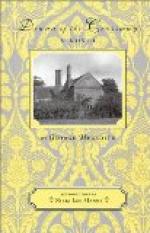Twice he passed her house. Of course no light was shown at her windows. They were scanned malignly.
He held it due to her to call and inquire whether there was any truth in the report of Mrs. Warwick’s illness. Mrs. Warwick! She meant to keep the name.
A maid-servant came to the door with a candle in her hand revealing red eyelids. She was not aware that her mistress was unwell. Her mistress had left home some time after six o’clock with a gentleman. She was unable to tell him the gentleman’s name. William, the footman, had opened the door to him. Her mistress’s maid Mrs. Danvers had gone to the Play—with William. She thought that Mrs. Danvers might know who the gentleman was. The girl’s eyelids blinked, and she turned aside. Dacier consoled her with a piece of gold, saying he would come and see Mrs. Danvers in the morning.
His wrath was partially quieted by the new speculations offered up to it. He could not conjure a suspicion of treachery in Diana Warwick; and a treachery so foully cynical! She had gone with a gentleman. He guessed on all sides; he struck at walls, as in complete obscurity.
The mystery of her conduct troubling his wits for the many hours was explained by Danvers. With a sympathy that she was at pains to show, she informed him that her mistress was not at all unwell, and related of how Mr. Redworth had arrived just when her mistress was on the point of starting for Paris and the Continent; because poor Lady Dunstane was this very day to undergo an operation under the surgeons at Copsley, and she did not wish her mistress to be present, but Mr. Redworth thought her mistress ought to be there, and he had gone down thinking she was there, and then came back in hot haste to fetch her, and was just in time, as it happened, by two or three minutes.
Dacier rewarded the sympathetic woman for her intelligence, which appeared to him to have shot so far as to require a bribe. Gratitude to the person soothing his unwontedly ruffled temper was the cause of the indiscretion in the amount he gave.
It appeared to him that he ought to proceed to Copsley for tidings of Lady Dunstane. Thither he sped by the handy railway and a timely train. He reached the parkgates at three in the afternoon, telling his flyman to wait. As he advanced by short cuts over the grass, he studied the look of the rows of windows. She was within, and strangely to his clouded senses she was no longer Tony, no longer the deceptive woman he could in justice abuse. He and she, so close to union, were divided. A hand resembling the palpable interposition of Fate had swept them asunder. Having the poorest right—not any—to reproach her, he was disarmed, he felt himself a miserable intruder; he summoned his passion to excuse him, and gained some unsatisfied repose of mind by contemplating its devoted sincerity; which roused an effort to feel for the sufferer—Diana




